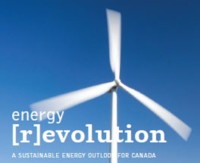A Sustainable Energy Outlook for Canada
 A new report from
A new report fromGreenpeace and the European Renewable Energy Council shows how
Canada can play an important role in addressing climate change
while generating jobs in the green economy.
The report outlines a blueprint that is nothing short of an
Energy [R]evolution - a transformation that has already started, as
renewable energy markets exhibit huge and steady growth. At the
core of this revolution will be a change in the way that energy is
produced, distributed and consumed.
The new report, Energy [R]evolution: A Sustainable Energy
Outlook for Canada, includes an advanced energy scenario for
Canada that places heavy emphasis on renewable energy and energy
conservation.
• Aggressive energy efficiency
measures would reduce Canada’s primary energy demand by 50 per
cent,
• Canadian consumers would save an
average of $5.3 billion per year, or roughly $135 per person per
year, on their energy bills over the next 40 years, relative to
relying on increasingly expensive fossil fuels,
• Overall, the contribution from
renewable sources of energy would rise from 15 per cent of Canada’s
primary energy demand today, to 25 per cent by 2020 and 74 per cent
by 2050.
• Renewable energy sources would
provide 96 per cent of electricity and 92 per cent of our total
heating needs demand by 2050,
• 77,000 jobs would be created in
the renewable power sector alone by 2030,
• Investments in public transit,
more efficient vehicles and switching freight from trucks to rail
would cut energy demand in the transportation sector by half. There
would also be a shift to hybrid, plug-in hybrid and
battery-electric vehicles, so that electricity would provide 24 per
cent of the transport sector’s total energy demand by 2030 and 60
per cent in 2050,
• The worldwide shift to more
efficient transportation systems and electric vehicles would reduce
the demand for oil by 25 per cent by 2030, and 66 per cent by
2050.
• Energy-related greenhouse gas
emissions would be reduced 21 per cent by 2020, 47 per cent by 2030
and 95 per cent by 2050.
This Advanced Scenario was developed in conjunction with
specialists from the Institute of Technical Thermodynamics at the
German Aerospace Centre (DLR), the Dutch Institute Ecofys and more
than 30 scientists and engineers from universities, institutes and
the renewable energy industry around the world.
The Canadian Energy [R]evolution report is part of a series of
country-specific scenarios for more than 30 countries. The series
provides a comprehensive global energy concept and breaks fresh
ground with detailed financial analysis and employment
calculations.
There is an analysis of how to restructure the global energy
system based on a detailed assessment for the potential of proven
renewable energy sources, energy efficiency and the utilization of
efficient, decentralized cogeneration.
The Canadian report provides three energy scenarios with a basic
Energy [R]evolution Scenario and the Advanced Scenario compared to
a ‘business as usual’ scenario provided by the International Energy
Association’s breakdown of 10 world regions as used in the ongoing
series of World Energy Outlook reports.
The report outlines the broad policy measures that must be
implemented in the energy sector in order to achieve these
goals:
- Phase out all subsidies for fossil fuels and nuclear
energy. - Internalize the external (social and environmental) costs of
energy production through “cap and trade” emissions trading. - Implement strict efficiency standards for all energy-consuming
appliances, buildings and vehicles. - Establish legally binding targets for renewable energy and
combined heat and power generation. - Guarantee priority grid access for renewable energy.
- Provide defined and stable returns for investors; for example,
through feed-in tariff programs. - Implement better labelling to provide more energy and
environment product information. - Increase research and development budgets for efficiency and
renewable energy
More details on the Energy [R]evolution report are available
target=”_blank”>here.
Source: www.greenpeace.org

